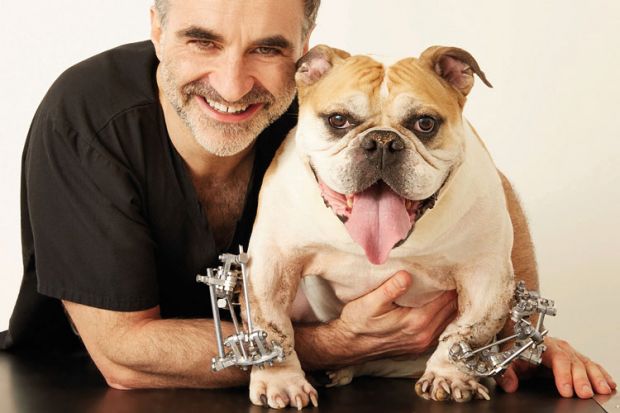Source: Lorenzo Agius
The value of an education is not found in books – it’s found in the training of the mind to never accept that you are always right, and to never accept that anything is impossible
Noel Fitzpatrick is best known for Channel 4’s The Supervet, in which television cameras follow his work as clinical chair and chief surgeon at Fitzpatrick Referrals, the state of the art surgery he set up in 2005. He is also one of the founding partners of the University of Surrey’s School of Veterinary Medicine, where he is professor of veterinary orthopaedics.
Where and when were you born?
On 13 December 1967, in Ballyfin, County Laois, in the middle of Ireland.
How has this shaped you?
It was a fairly “functional” existence, with every waking moment living and breathing the farm. There was no such thing as work and no such thing as time off – it was simply a way of life. I suppose that’s part of what makes me who I am.
Academics on television are often on very specific educational programmes while yours has a human interest edge to it. Is the purpose of your role to educate or to entertain or both?
It is my firm belief that education without entertainment is not just boring – it’s less likely to connect in a meaningful and lasting way. Nobody is going to sit there and watch a dry hour of TV blabbing on about science this and implant and drug that – what people want to watch is the infinitely variable journey of the human and animal spirit that we show in all its sadness, happiness, success and failure. That’s entertainment, and that’s very necessary to send a message to the world.
You’re known as the “bionic vet” for pioneering new surgical techniques for animals. What inspired you to explore this kind of surgery?
Frustration! My vocation was always destined to be working with animals and helping to get them out of pain and to improve their quality of life. I could see that animals would often do fine on three legs, and I’m cool with that – but there are some animals that do not cope well on three legs. I think it’s all too easy to cop out and say, well, an animal can “manage” – when I feel that the real issue is whether an animal’s quality of life is optimised.
How affiliated to the University of Surrey is Fitzpatrick Referrals?
Fitzpatrick Referrals is a private company and there is no financial association with the University of Surrey. However, several years ago, a few people including me sat in a room and felt that a vet school would be a good thing for Surrey – and so it is. I’m intensely proud of our association with the university and our goal is that vet students can experience cutting-edge medical and surgical advances at the coalface in our clinical practice, while also being an outward-facing research hub that welcomes collaboration and partnerships for the greater good of the vet students, the university, industry and both veterinary and human medicine.
What is funding like for veterinary research? Is it somewhat overshadowed by funding for human medical fields?
Absolutely yes. It is much easier to get funding in the veterinary arena if animals are being used as a model for human disease. It has been thus for more than 250 years. I’m not at all averse to the absolute need for human medicine to move forwards using animal models at its core – in fact it’s the only way that human medicine can advance. What does upset me is the disregard for clinical veterinary and human practice moving forwards together. To me, it is lunacy that research money isn’t poured into animal models that actually help animals and humans at the same time – rather than just animal models that sacrifice the animal to help humans only.
If you were a prospective university student now facing £9,000 a year fees, would you go again or go straight into work?
I would absolutely do it again and I would work like crazy doing many jobs to make it happen. The value of an education is not found in books – it’s found in the training of the mind to never accept that you are always right, and to never accept that anything is impossible.
What kind of undergraduate were you?
I was a nerdy swot – because I knew that I didn’t know everything, and I was keen to catch up.
What policy would you implement if you were higher education minister for the day?
I would make all university graduates that earned more than £100,000 a year put £1,000 every year into a fund. This fund would be accessible only if you wanted to attend higher education, if your family income was less than £45,000 a year and if your family home was worth less than 50 per cent of the national average. Oh – and each applicant would have to sit a specially designed test that is yet to be developed – and it can measure whether your heart is bigger than your brain. I think this world needs a little less pontification and a little more love.
Register to continue
Why register?
- Registration is free and only takes a moment
- Once registered, you can read 3 articles a month
- Sign up for our newsletter
Subscribe
Or subscribe for unlimited access to:
- Unlimited access to news, views, insights & reviews
- Digital editions
- Digital access to THE’s university and college rankings analysis
Already registered or a current subscriber? Login

